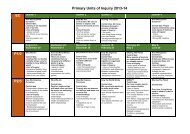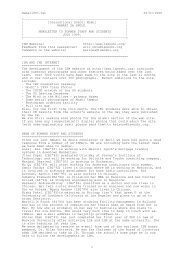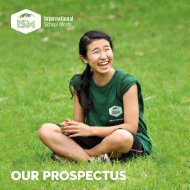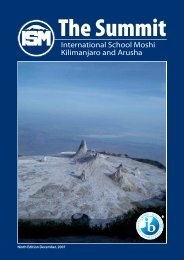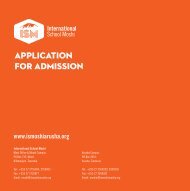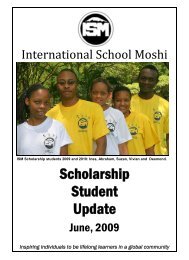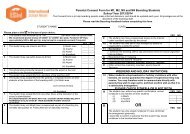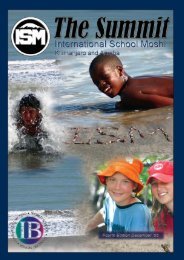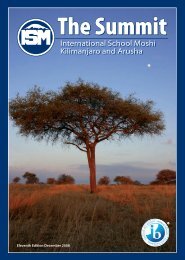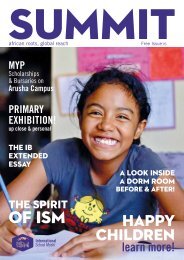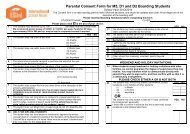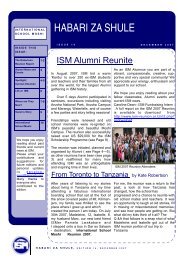Primary Handbook - International School Moshi
Primary Handbook - International School Moshi
Primary Handbook - International School Moshi
Create successful ePaper yourself
Turn your PDF publications into a flip-book with our unique Google optimized e-Paper software.
PYP style: Units of InquiryIn the primary years of education it is important to provide opportunities for studentsto build meaning and refine understanding, principally through structured inquiry.Children, from birth, are full of curiosity. The PYP provides a framework that buildson this to give crucial support for them to be active inquirers and lifelong learners.CurriculumThe PYP curriculum is broad,balanced and inclusive. A balance issought between acquisition ofessential knowledge and skills, thedevelopment of conceptualunderstanding and the demonstrationof positive attitudes. The importanceof traditional subject areas isacknowledged: language (English andKiswahili), mathematics, socialstudies/humanities, science, thearts and personal social and physicaleducation. These subject areas aretaught through Units of Inquiry, atransdisciplinary approach, the PYPteaching team ensures that studentwill achieve high expectations in termsof learning outcomes.AssessmentIn the PYP, assessment shouldeffectively map students’ developmentin the understanding of concepts, theacquisition of knowledge, the mastery ofskills, the development of attitudes, andthe ability to make decisions to takeresponsible action. On-goingAssessment in the PYP classroom willinclude analysis of students’ work orperformances using rubrics, checklists,pencil/paper tests, daily observationsand portfolios, summarized on reportsand shared with parents during ThreeWay Conferences. Students are activelyinvolved in assessing their ownlearning. They create their own StudentPortfolios; they show their learningin Student Led Two Way Conferences .LanguageIn the PYP, ESL students from P1/2 toP5/6 receive support from ourspecialist ESL teacher who worksclosely with the class teachers andLearning Support teacher.All students study Kiswahili for two 40minute periods a week. In addition,P3/4 and P5/6 students study Frenchfor two 40 minute periods a week.ESL students are withdrawn for extrasupport during French time.AssemblyThe purpose of our Assemblies isfor the students to share some of theirlearning to build a sense of communitywithin the school and to publiclyacknowledge students who show theLearner Profile through their behaviourin our school. Each class has a turn toshowcase what they have learnt.Parents are welcome to attend theseassemblies.PYPPYP students are accompanied by a whole teaching team, led by the class teacher.The class teacher is helped by a Teaching Assistant and also works in a team withspecialist teachers. In the PYP, regular communication between the teachers andparents takes place through the Homework and Communication book. The following<strong>Handbook</strong> is intended to convey to parents and students a broad understanding ofthe content and sequence of the material covered at each grade level. Additionaldetail on each of these programmes can be found on the ISM website, curriculumdocumentation, and IB website.



